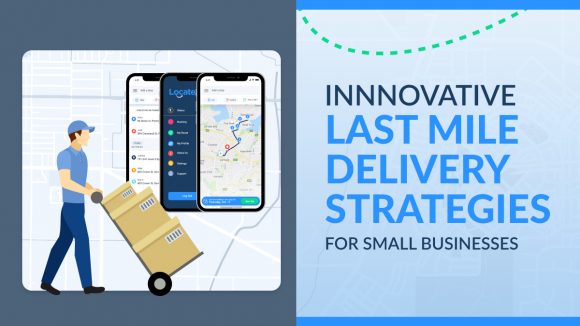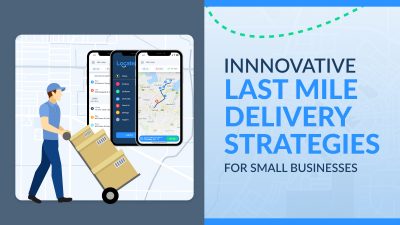Innovative last mile delivery strategies for small businesses are key to surviving in the cutthroat e-commerce sector. The term “last mile delivery” describes the movement of goods from a warehouse or transportation hub to their final location, which is frequently the doorstep of the client or a business.
Last-mile transport is more challenging for small businesses given high delivery costs, a lack of infrastructure, and increased competition. However, by implementing creative last mile delivery tactics, small firms can overcome these difficulties. This article looks at some of the best tactics small businesses may use to automate last-mile delivery, such as utilizing local networks, providing different delivery options, and implementing technology.
What is last mile delivery?
The phrase “last mile delivery” describes the final phase of the delivery process where goods or supplies are moved from a distribution center or warehouse to their final location, which is typically a client’s doorstep or a company location. This delivery stage is seen as the most challenging and expensive stage of the delivery operation due to the challenges of navigating metropolitan regions, managing large numbers of parcels, and achieving customer expectations for speedy and dependable delivery.
Happy customers, brand reputation, and overall business performance can all be significantly impacted by how well last mile delivery, an important supply chain link, performs. Delivery drivers, logistics service providers, and business owners are commonly involved in last-mile delivery, which requires careful planning, coordination, and execution.
What are the challenges of last mile delivery for small businesses?
The cost of delivery is one of the main obstacles to last-mile delivery for small enterprises. Small businesses may find it difficult to provide economical delivery choices due to the high cost of labor and transportation, especially for low-margin products. The requirement to provide quick and flexible delivery alternatives can also raise the cost of last-mile delivery.
The absence of delivery networks and infrastructure represents yet another major obstacle. Small companies frequently lack the funding necessary to build a robust distribution network, which can cause delays and missed deliveries. Customers may become upset as a result, which could harm the company’s reputation.
Unexpected occurrences like traffic jams, inclement weather, or vehicle breakdowns can cause delays and missing deliveries during the delivery process. These difficulties can increase prices and necessitate last-minute fixes, making last-mile delivery more difficult.
Additionally, customers now have higher expectations for delivery alternatives and timings as a result of the increased competition in the e-commerce sector. Meeting consumer requests is difficult for small firms since they must compete with bigger corporations that provide faster and more flexible delivery alternatives.
Overall, this type of delivery presents various difficulties for smaller businesses. To give customers a great delivery experience, small businesses must overcome obstacles such high delivery costs, a lack of infrastructure, an uncertain delivery process, and growing competition. However, small businesses can overcome these difficulties and succeed in the cutthroat e-commerce sector by utilizing cutting-edge technologies and creative business methods.

Innovative Last Mile Delivery Strategies for Small Businesses
The logistics of last-mile fulfillment have a common source of difficulty for small enterprises, which can be particularly challenging for those with little resources. To overcome these difficulties and enhance last-mile delivery capabilities, local network leveraging can be a vital tactic.
Below are some of the innovative last mile delivery strategies for small businesses.
Local delivery network
Small businesses can access current delivery networks and create new ones with the aid of local alliances and collaborations, enabling them to provide reliable and affordable delivery options. Small businesses can take use of the network and experience of these partners by teaming up with regional delivery services, couriers, or other companies that offer complementary services.
To provide direct-to-consumer delivery, a small grocery shop might collaborate with a nearby CSA (Community-Supported Agriculture) program. The grocery store can now provide more products to its consumers thanks to this agreement without having to spend additional money on expanding its delivery system. The CSA program, on the other hand, can use the grocery store’s current customer base to reach out to new customers, which will benefit both parties.
Another instance is a neighborhood flower store working with a neighboring gift shop to provide combined delivery services. Without having to spend more money on new delivery infrastructure, this agreement enables both companies to offer their clients a greater variety of products. Together, they can reduce delivery costs and reach more customers, which will increase their revenue.
Partnerships with other companies are not the only way to leverage local networks. To create last-mile delivery networks, small enterprises can also collaborate with neighborhood associations, local charities, and schools. Small businesses can take advantage of their existing network and reputation by collaborating with these organizations to efficiently deliver goods to customers.
More delivery operations
The importance of providing various delivery alternatives is growing in the competitive last-mile delivery market. Customers now expect a variety of delivery options that accommodate their busy schedules and preferences. By meeting these customer expectations and offering a satisfying delivery experience, small businesses that are able to offer flexible delivery options can gain a competitive advantage.
Customers who order perishable or time-sensitive goods can benefit from same-day or on-demand delivery. Due to collaborations with local couriers or the usage of delivery management software, small businesses no longer need to have their own delivery fleet in order to provide same-day or on-demand delivery. Small businesses can therefore provide a prompt and dependable delivery service without having to invest money on maintaining their own delivery infrastructure.
To summarize, a crucial tactic for small businesses trying to enhance their last-mile delivery skills is to offer flexible delivery options. Small businesses can increase customer loyalty and get a competitive edge in their industry by catering to the speed and convenience demands of their customers.
Technology
For small businesses trying to increase their last-mile delivery capabilities, embracing technology can be a game-changer. A variety of technologies are available that can assist small firms in streamlining their inventory management, delivery tracking, and other activities.
Delivery management software
One piece of technology that can aid small firms in streamlining their delivery procedures is delivery management software. Businesses can track inventory in real-time, schedule deliveries automatically, and manage their delivery fleet more effectively thanks to this program. Small businesses can concentrate on their core business by employing delivery management software to cut down on the time and effort needed to manage their deliveries.
GPS tracking software
GPS tracking is another piece of technology that can help small businesses improve the effectiveness of their last-mile deliveries. By using GPS tracking to monitor the whereabouts of their delivery fleet in real-time, businesses can correctly inform customers of the status of deliveries. This can help businesses reduce delivery errors and give customers a better delivery experience.
Real-time tracking software
Real-time updates are also crucial for small businesses wanting to enhance their last mile delivery experience. By providing customers with real-time updates on the status of their deliveries, businesses may improve communication and foster better customer experiences. This can increase a business’s chances of repeat business and foster customer loyalty.
Drones and autonomous cars, among other autonomous delivery options, can aid small enterprises in enhancing their last-mile delivery capacities. Businesses can decrease delivery times and costs while enhancing their delivery capabilities by utilizing autonomous delivery systems. Additionally, these technologies might aid companies in overcoming distribution difficulties in regions with challenging terrain or restricted access.
All things considered, adopting technology can be a crucial tactic for small firms trying to enhance their last-mile delivery skills. Small firms can increase delivery efficiency, cut costs, and improve customer satisfaction by utilizing delivery management software, GPS tracking, real-time updates, and autonomous delivery systems.
How do I manage my delivery business?

A delivery management program like Locate2u is one option to think about if you need to manage your delivery operation. This software offers a range of features to help businesses manage their delivery operations more efficiently.
The GPS tracking technology of Locate2u is one of its standout features. By giving precise updates on the status of each delivery, this technology enables organizations to follow the whereabouts of their delivery fleet in real-time. This can facilitate more effective delivery management for organizations, speed up deliveries, and increase client satisfaction.
Locate2u offers a number of other options to assist businesses manage their deliveries in addition to GPS tracking. They consist of driver management, route optimization, and delivery scheduling. These capabilities enable businesses to automate their delivery procedures, save down on the time and effort needed to manage deliveries, and concentrate on their core competencies.
Moreover, Locate2u provides drivers with a smartphone app that enables them to track deliveries, view their delivery schedule, and interact with clients in real-time. This can assist drivers in staying on schedule and improve the customer delivery experience.
Overall, delivery management software like Locate2u can be a terrific solution if you’re trying to manage your delivery firm. Businesses can optimize their delivery processes, cut expenses, and improve customer satisfaction using Locate2u’s features including GPS tracking, delivery scheduling, and driver management.
Case study example: Husk Bakery

The success of Husk Bakery is proof of the value of creativity and flexibility amid trying circumstances. The company was able to change course and introduce a mobile bakery to transport its goods closer to customers in the face of natural catastrophes, pandemics, and economic difficulties. The problem of informing clients of the location of the mobile bakery persisted, nevertheless.
Thankfully, Locate2u, a GPS monitoring and sharing tool for small businesses, provided the Husk Bakery with a solution. Customers were able to trace the mobile bakery’s path and know exactly where it was at all times by following the Locate2u tracking link that Husk Bakery used to broadcast its real-time location with them via social media. The bakery’s customer base increased by over 30% the first day it was implemented thanks to this easy solution, which also helped the owner save about 45 minutes every day.
The use of GPS tracking technology not only made it easier for customers to find Husk Bakery but also helped the business optimize its operations. The owner was able to take orders on the day and package them up ready to be collected, saving time and increasing efficiency. With Locate2U’s help, the business was able to become more profitable, even after the lockdown laws were lifted.
Overall, Husk Bakery’s story demonstrates how small businesses can leverage technology to stay competitive and grow, even during challenging times. By embracing innovation and finding the right tools, businesses can adapt and thrive in any environment.
Transform your last mile delivery strategy

There you have it folks! Having gone over a few innovative last mile delivery strategies for small businesses, here’s one that will make all the difference. Locate2u!
If you’re wanting to meet customer demand then offering more delivery options, like same day delivery is the way to go! With Locate2u you can get goods to customers faster and more efficiently, reducing the stress that typically exists alongside last mile delivery.
Guarantee your customers a fast delivery experience by clicking here.











